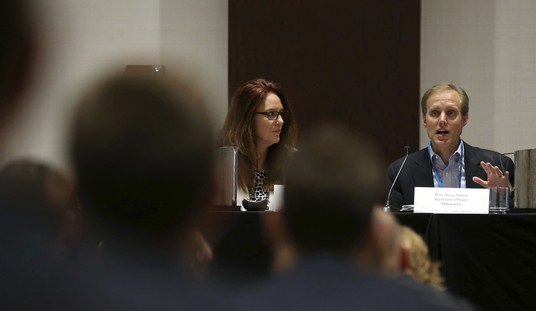While Congress debates how to take over the health-care industry, more evidence arrives that shows it can’t even handle the business it has already. The Congressional Budget Office estimates that the federal deficit accelerated in July by $181,000,000,000 ($181 billion) and hit $1,300,000,000,000 ($1.3 trillion) for 2009. The massive new hit to the annual deficit comes from rapidly falling revenues, and an even more rapid increase in spending:
Bailouts for financial firms and billions in tax revenue lost because of the recession drove the deficit to a record $1.3 trillion in July, according to the independent Congressional Budget Office (CBO).
Tax receipts that have fallen due to the poor economy and increased spending to save car companies, banks and mortgage firms were major contributors to the federal deficit, according to CBO, which provides official budget numbers for Congress. The federal deficit grew by another $181 billion in July. …
Spending through July of 2009 has increased by $530 billion, which is 21 percent over the same period in 2008. The bailout money for Freddie Mac and Fannie Mae accounted for almost half of the spending increase. Unemployment benefits have more than doubled, Medicaid spending has grown by a quarter and Medicare spending has increased by 11 percent.
Tax revenue for the first three quarters of 2009 has fallen by approximately $350 billion, or 17 percent compared to the same period last year, due mostly to the effects of the recession on payroll, income and corporate taxes. A third of the decline is due to tax breaks in the stimulus, including the middle-class tax cut that President Obama campaigned on during last year’s election.
Let’s compare those numbers for a moment. Tax receipts declined by 17% in July, but spending went up by 21%. Shouldn’t spending decrease when less money gets received? For American families, that’s certainly how it works. At the very least, one would expect Congress to hold the line on spending and stop any increases when it expects less revenue. That would be the fiscally responsible path to take in an economic crisis.
Where did that money go? It went to the continuing bailouts of financial firms and to the automakers. Money also got spent on a stimulus package that has failed to stimulate anything, except a few thousand temp jobs and state deficit spending. All that money stimulated was bureaucracies at the state and federal level, and at best paid for projects in 2009 that would have been funded through normal channels in the next year or two anyway.
Small wonder Barack Obama postponed the administration’s release of budget numbers last month in the middle of the health-care debate. With the 38% swing in the deficit from last July, it would have made proposing a massive new federal program to run the nation’s health care much more difficult to justify. Would you trust your health-care decisions to someone who can’t balance a checkbook?








Join the conversation as a VIP Member